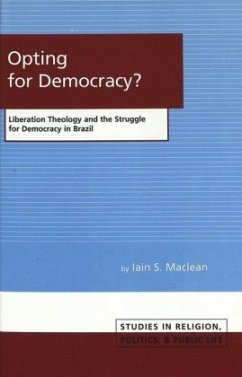Liberation theology is often characterized as rejecting democracy and, based upon their option for the poor, advocating a form of socialism. This claim is challenged through an analysis of the works of Brazilian liberation theologians, Catholic social teaching, and studies on the base community movements in Brazil from the imposition of military rule through democratization (1964-1992). Liberation theologians initially rejected liberal democracy, but by the nineties were advocating a participatory and ecological democracy. However, they differed on how such a democracy was to be achieved in the competitive political party arena. In addition, increasing ecclesiastical opposition and the collapse of existent socialist regimes marginalized liberation theologians' vision of an inclusive, participatory democracy.
"This is a timely book painstakingly researched and clearly written. Since the birth of liberation theology [the question] continues to be asked: What is the relationship of liberation theology to democracy? This book directs our attention both backwards and forwards by supplying us with the categories and parameters we will need to make sense of the baffling blends of religion and politics that will surely occupy the world's attention in the next decades." (Harvey G. Cox, Thomas Professor of Divinity, Harvard University)
"'Opting for Democracy?' examines 'inter alia', the promises of democracy attributed to ecclesial base communities against the realities of a post-military regime in Brazil. It shows that due to the centrality of the Roman Catholic Church, most of its progressive work depends on the hierarchy, and that greater religious participation does not necessarily translate into greater changes in the political and economic spheres." (H. Cavalcanti, Professor of Sociology, University of Richmond)
"Maclean's grasp of the religious and political history of Brazil during the twentieth century is most impressive. With accuracy and insight, he succeeds in enabling the reader to perceive the ambiguities, inconsistencies, and polemics of what the Roman Catholic Church has taught, what it has practiced, and how it has informed, for better and for worse, the political consciousness, social vision, and democratic aspirations of the Brazilian people." (Margaret Eletta Guider, Associate Professor of Religion and Society, Weston Jesuit School of Theology, Cambridge, MA)
"'Opting for Democracy?' examines 'inter alia', the promises of democracy attributed to ecclesial base communities against the realities of a post-military regime in Brazil. It shows that due to the centrality of the Roman Catholic Church, most of its progressive work depends on the hierarchy, and that greater religious participation does not necessarily translate into greater changes in the political and economic spheres." (H. Cavalcanti, Professor of Sociology, University of Richmond)
"Maclean's grasp of the religious and political history of Brazil during the twentieth century is most impressive. With accuracy and insight, he succeeds in enabling the reader to perceive the ambiguities, inconsistencies, and polemics of what the Roman Catholic Church has taught, what it has practiced, and how it has informed, for better and for worse, the political consciousness, social vision, and democratic aspirations of the Brazilian people." (Margaret Eletta Guider, Associate Professor of Religion and Society, Weston Jesuit School of Theology, Cambridge, MA)
